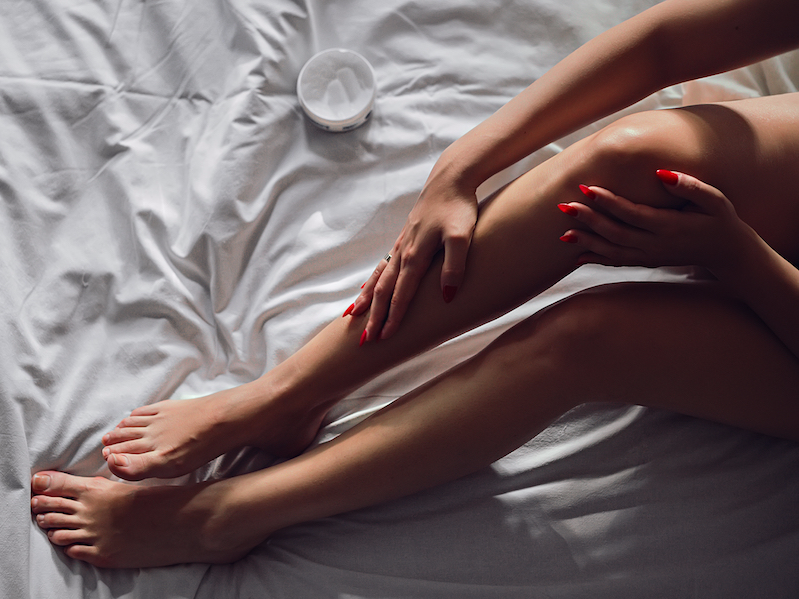- If you don’t want a wound to leave a scar, care for it before it has the chance to develop a scab.
- A scab is the like the human body’s own bandage, but you must keep it clean and moisturized.
- The more you hydrate and care for a wound, the less likely it is that you will develop a scar.
So, you scraped your knee or picked at a pimple. You now have a wound, or maybe a scab, and the last thing you want is for it to form a scar. The key to avoiding scars is to take care of the wound before a scab can even form, however, if you missed that step and already have a scab, the care is largely the same.
When your skin experiences a trauma, a scab is formed, and when the skin has healed and the scab falls off, a scar is left in its place. According to Debra Jaliman, MD an American Academy of Dermatology spokesperson, “the darkness of the skin [in the scarred area] depends on the degree of the trauma,” which is why it’s imperative to take care of the wound before the scab even forms.
“The more trauma to the skin, the longer it is going to take for the wound to heal and also the greater the chance of having an obvious scar,” Dr. Jaliman added. “Taking proper care of your trauma initially is crucial because it will ultimately dictate how it heals.”
Sometimes a scar will form regardless because of various factors including your genetic makeup or the size and severity of the wound, but these tips could help you lessen its impact or simply keep your wound clean.
Before the scab even forms, proper wound care is the key to avoiding scarring

Dr. Jaliman said that wound care is all about keeping "the area moisturized and hydrated. Anything that creates a protective barrier on the skin's surface to lock in moisture to help protect skin while it heals will help lessen the chances of a noticeable scar."
The American Academy of Dermatology recommended cleaning the wound every day, covering it in petroleum jelly, and then bandaging it, making sure to change the bandage every day.
Instead of a bandage, Dr. Jaliman said she also likes using silicone gel sheets on the wound which keep the area hydrated and reduce irritation and redness.
Joshua Zeichner, MD, director of cosmetic and clinical research in the department of dermatology at Mount Sinai Hospital recommends covering the cleaned wound with antibiotic ointments like over-the-counter bacitracin which he says to apply around the clock to help "keep the open skin area protected from the environment."
The bacitracin also "kills any bacteria on the skin [which helps] to minimize the risk of infection."

If you don't protect the skin in any of the aforementioned ways and leave it open to the environment, that's when a scab will form, which Dr. Zeichner called "mother nature's bandage." When and if this happens, Dr. Zeichner said that you must "leave [the scab] alone and let it fall off on its own. If you try to pick a scab, you may be more likely to develop inflammation or even an infection" which increases the chances of developing an even worse scar.
However, if a scab has formed, scab care is largely the same as it is for wound care
To care for a scab that has already formed over a wound, keep the area moisturized and hydrated either by using petroleum jelly, silicone gel sheets, or covering it with a bandage.
If you did all this and still have a scar, there are still a variety of ways to decrease the scar's appearance

You can use the aforementioned silicone gel sheets on an existing scar to help smooth and flatten them. Vitamin A has long been used in scar treatment because Dr. Jaliman said it stimulates the cells responsible for producing the tissue that keeps skin firm and healthy and therefore encourages healthy new skin cell production.
If the scar is on your face (say from acne that was picked at) Dr. Jaliman said that salicylic acid "will help fade spots by exfoliating dead skin cells and smoothing out skin texture" and also suggests glycolic acid which "promotes cell turnover" by sloughing off the top layer of the skin, which can help fade a dark or rough scar.
Of course there are times when you cannot prevent a scar, due to the size of the wound or your genetic makeup and that's OK. But these tips can help make you more comfortable and can make sure that traumas stay clean and healthy.
Visit INSIDER's homepage for more.

